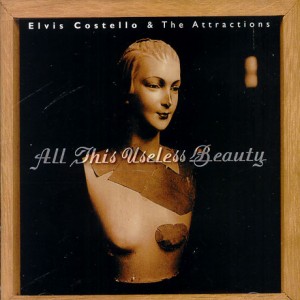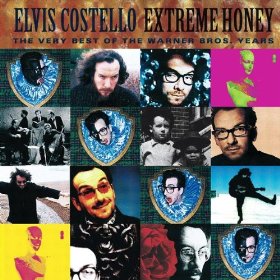
"All This Useless Beauty" Was The Final Album Elvis Costello Cut With The Attractions
Costello’s artistry was in permanent evolution during the mid-90s. Learning to write music at the start of the decade was the first of many events that led him to reconsider his position as a performer and a composer. In 1995 he released a disc devoted from start to finish to covers. The title of the album was “Kojak Variety”, and it felt more like a resume than anything else. There was only one true gem, namely the version of The Kinks’s “Days” (a little known non-album side that is often packaged as a bonus on reissues of “The Village Green Preservation Society” today). And in 1996, after having given us the chance to glance at those artists whose music spoke to him in one level or the other, Costello swapped sides and looked at how he spoke to other artists. He ran through songs he had written for others to perform, and decided to interpret them for what was to be the final studio album with The Attractions: “All This Useless Beauty”.
At the time, many critics did not get the point. The charge was that Costello was running out of steam, hence his decision to play other people’s material. Now, more than fifteen years later we know that Costello was not really running out of steam. Rather, he was accumulating steam for an unbridled return. He wasn’t empty – he was almost half-full by then. He let it all grow and grow inside of him, and when the time came he ventured forth again without breaking stride with albums like “The Delivery Man”, “Il Sogno” and “Momofuku”.
But that was to come later. If we situated ourselves back in 1996, what we had was a disc made up of songs written for others like “Complicated Shadows” (composed for Johnny Cash) and “All This Useless Beauty” (penned for June Tabor) along with collaborations like “The Other End Of The Telescope” (written with Aimee Mann, and originally issued on ‘Til Tuesday’s album “Everything’s Different Now”) and “Shallow Grave”, a leftover from the writing sessions with Paul MacCartney.
Surprisingly for songs that came from so many sources and that were meant for so many dissimilar destinations, the album had quite a pronounced sense of unity. Of course, some songs were altered in order to suit Elvis’ sound – “Complicated Shadows” was done as a loud rocker, and a countrified version was not to surface until “Secret, Profane & Sugarcane” saw release in 2009.
“All This Useless Beauty” had a predominance of ballads and mid-paced cuts. The exceptions were “Complicated Shadows”, the rockabilly-oriented “Shallow Grave” and the exciting “You Bowed Down” (grossly omitted on “Extreme Honey”). This stood in direct contrast with “Brutal Youth”, a disc that was defined by songs in which Costello revisited his roots. There is only one tune on “All This Useless Beauty” that could have fitted on the previous disc, namely “Starting To Come To Me”. But if the energy was what characterized “Brutal Youth”, a true refinement would be the key note of “All This Useless Beauty”. And that refinement didn’t just boil down to the actual performances being tamer. Mitchell Froom was no longer acting as Costello’s producer. That was a defining factor. Continue reading

